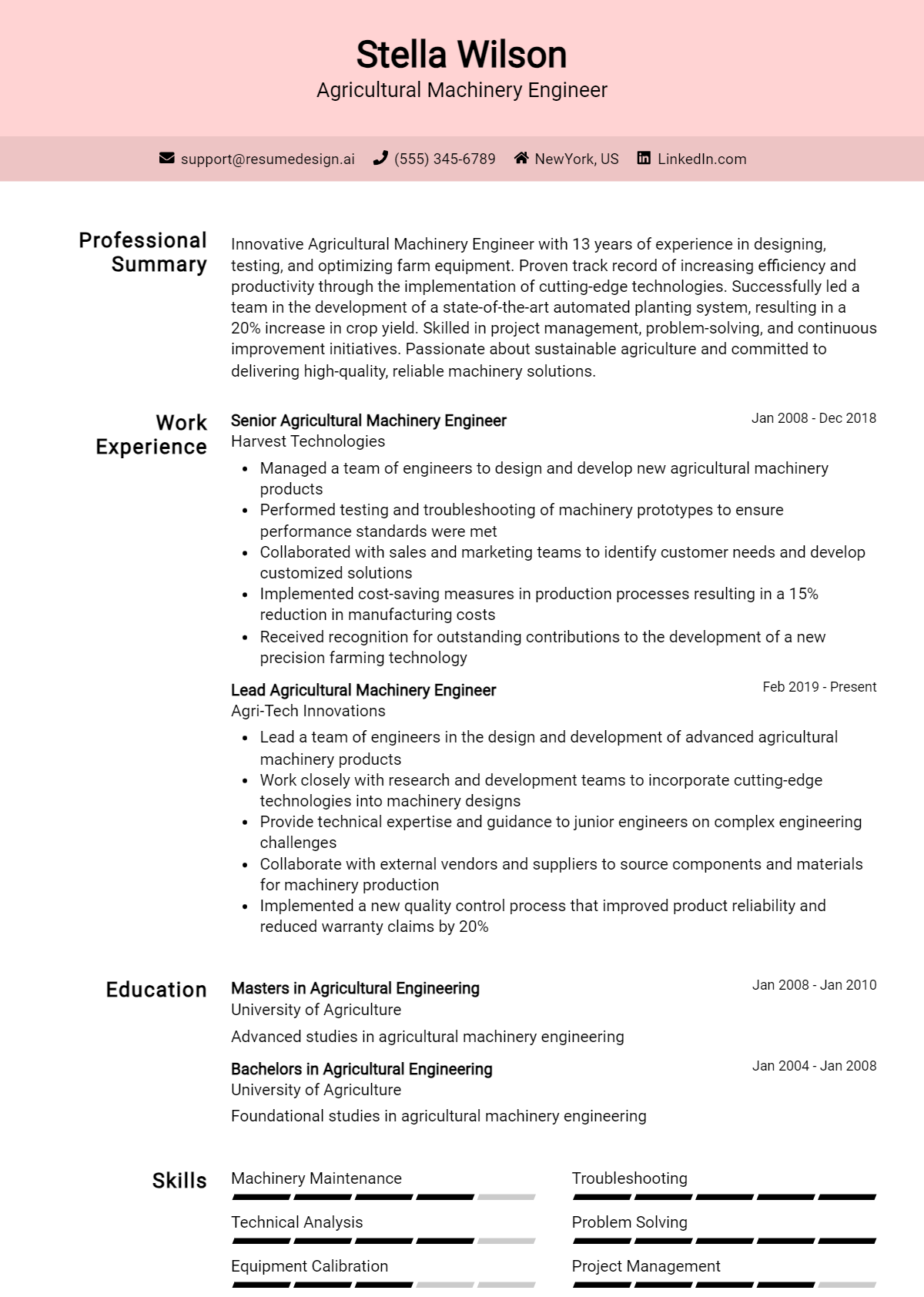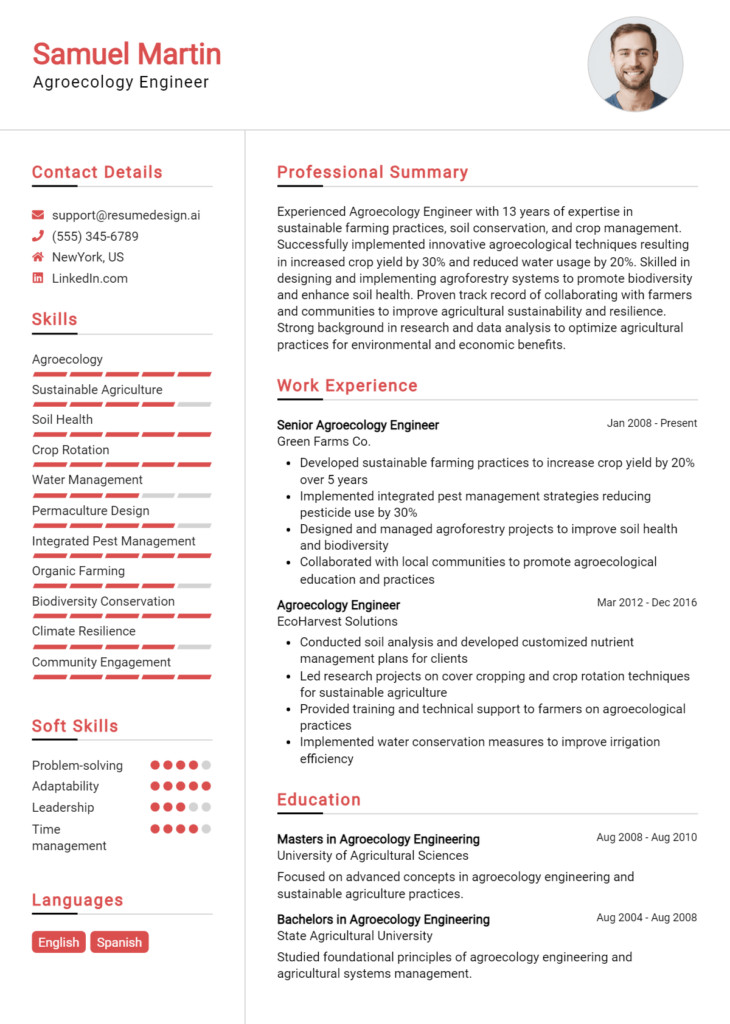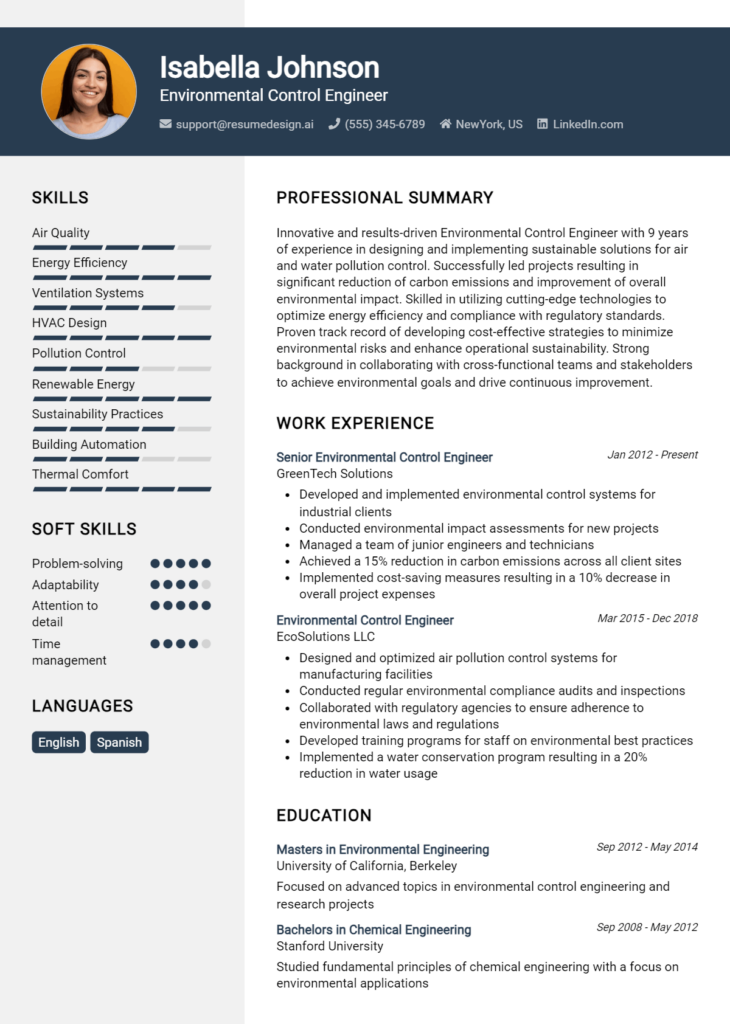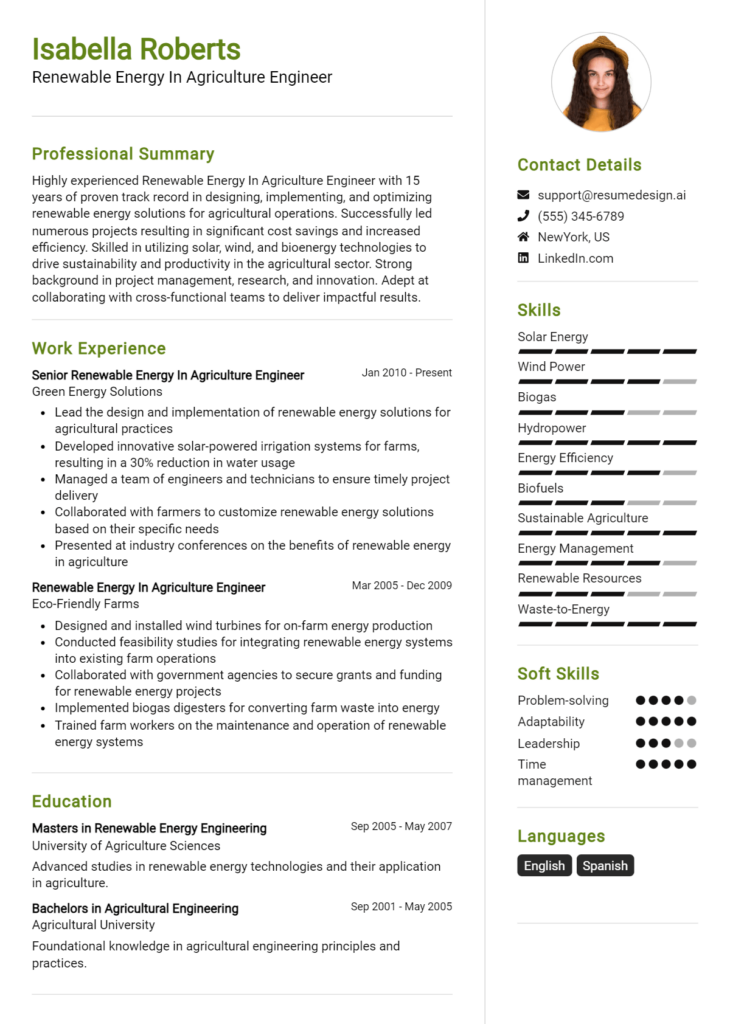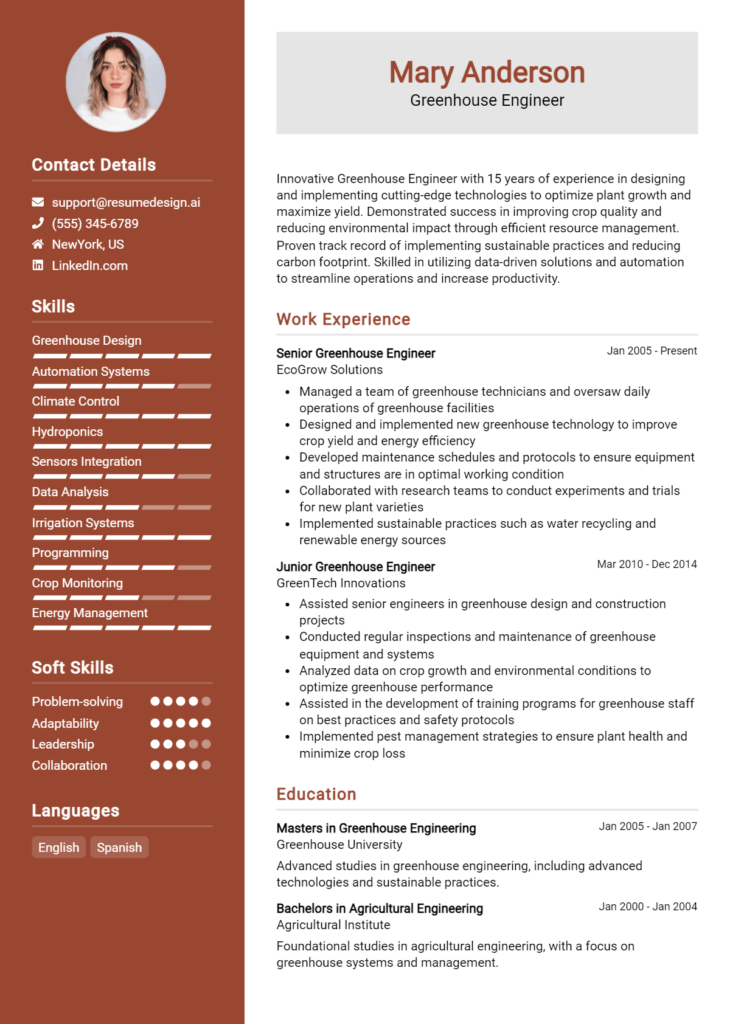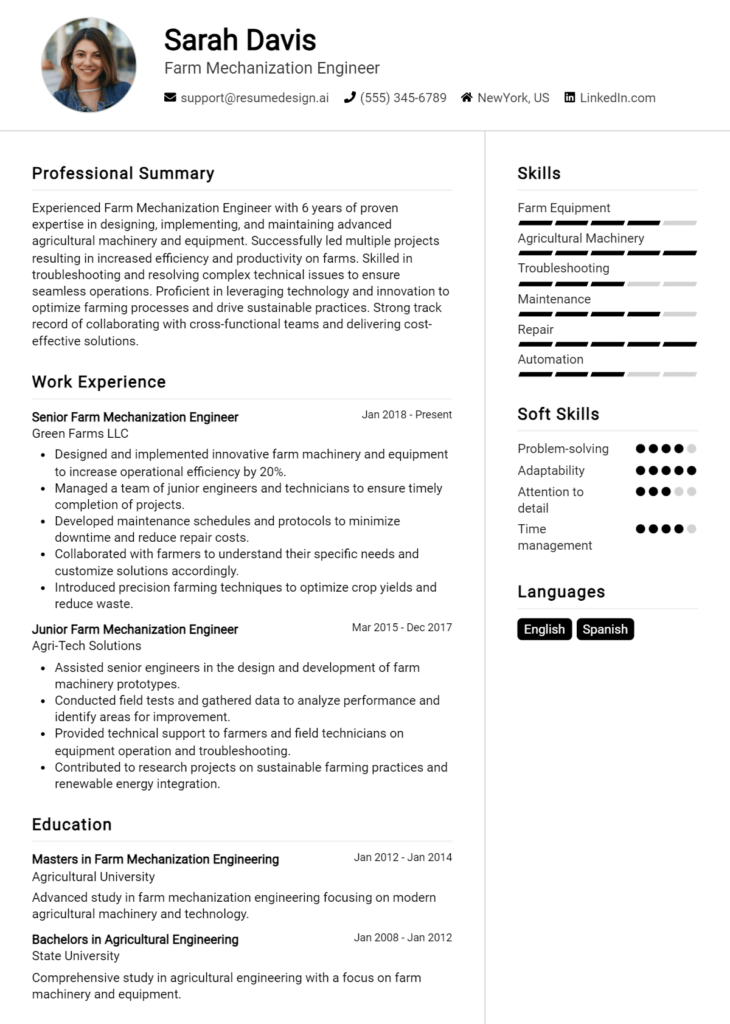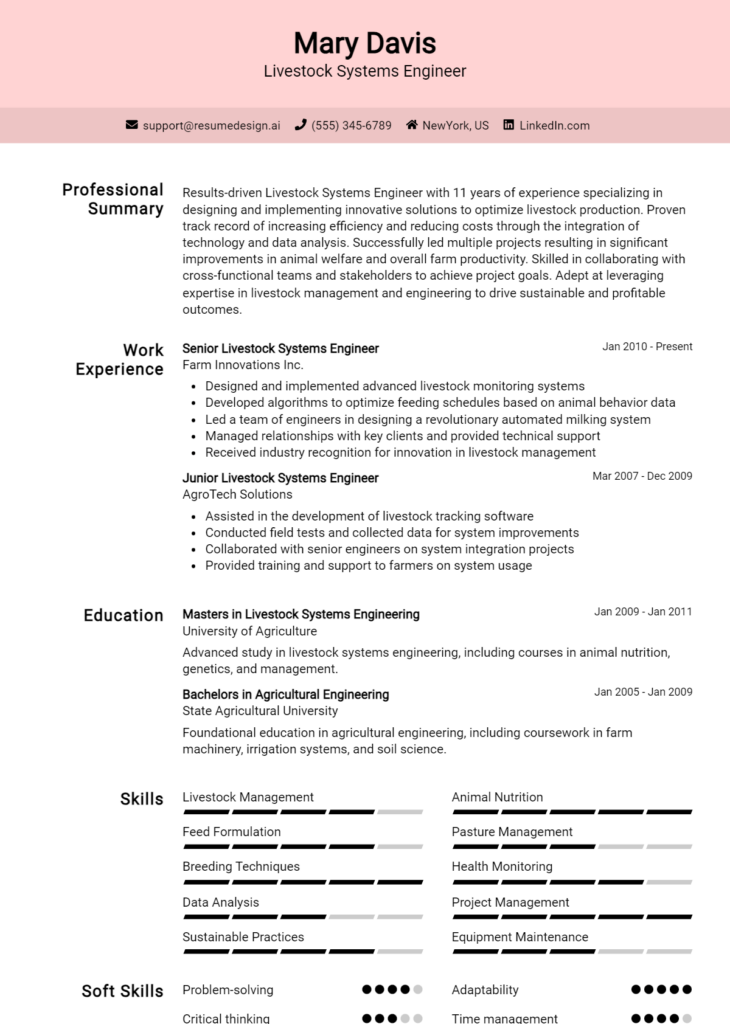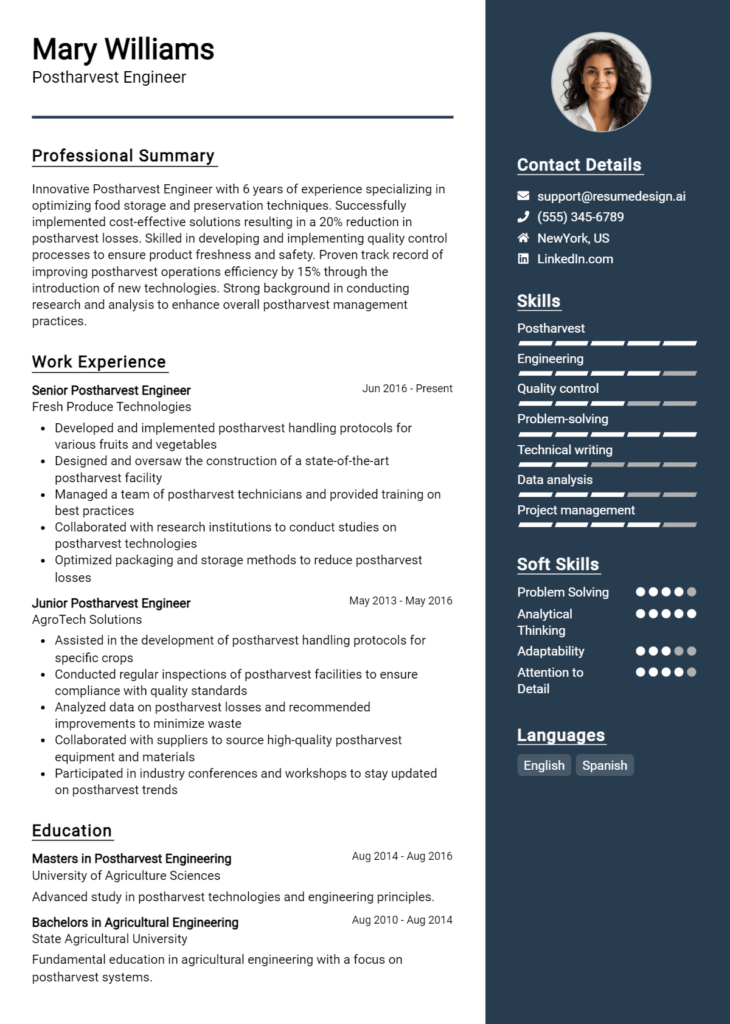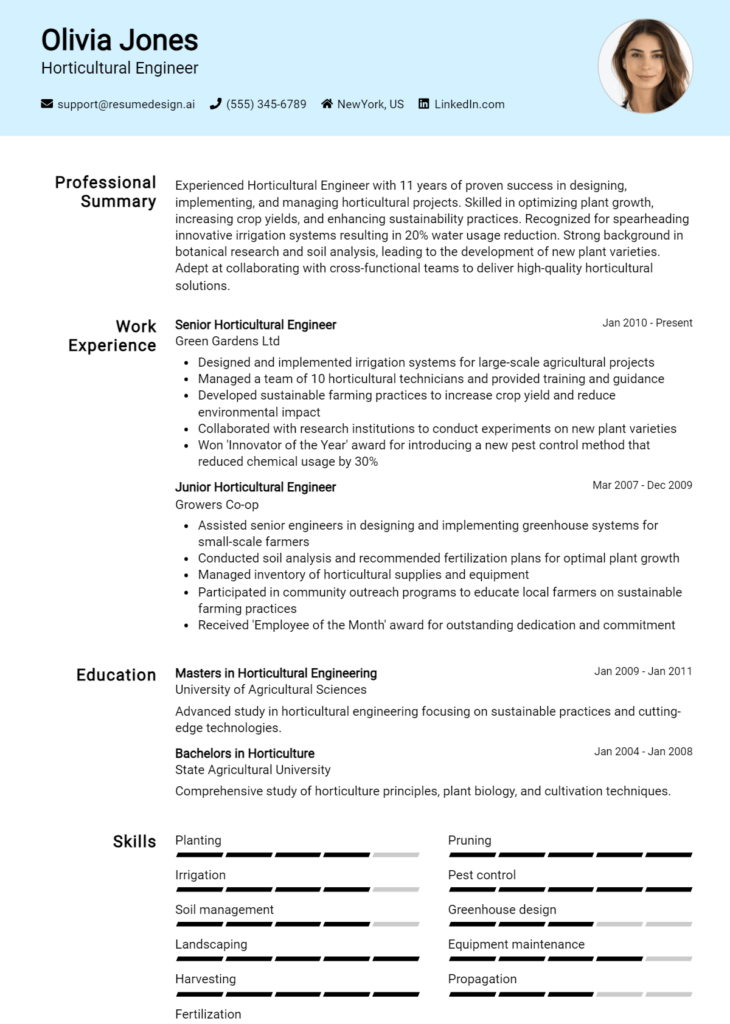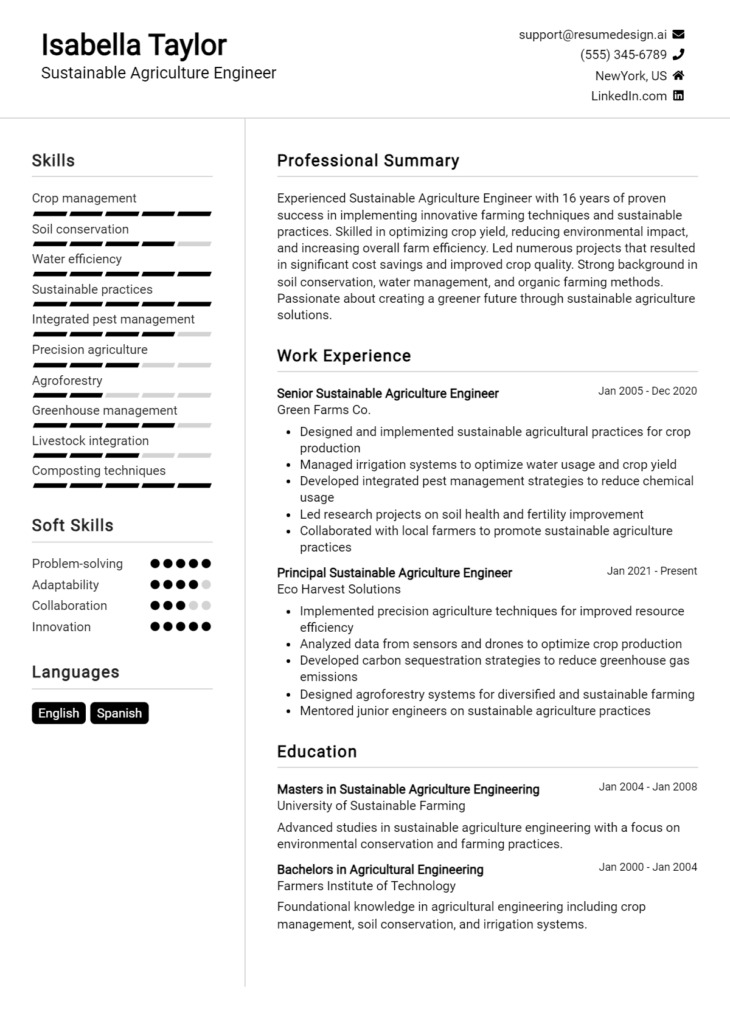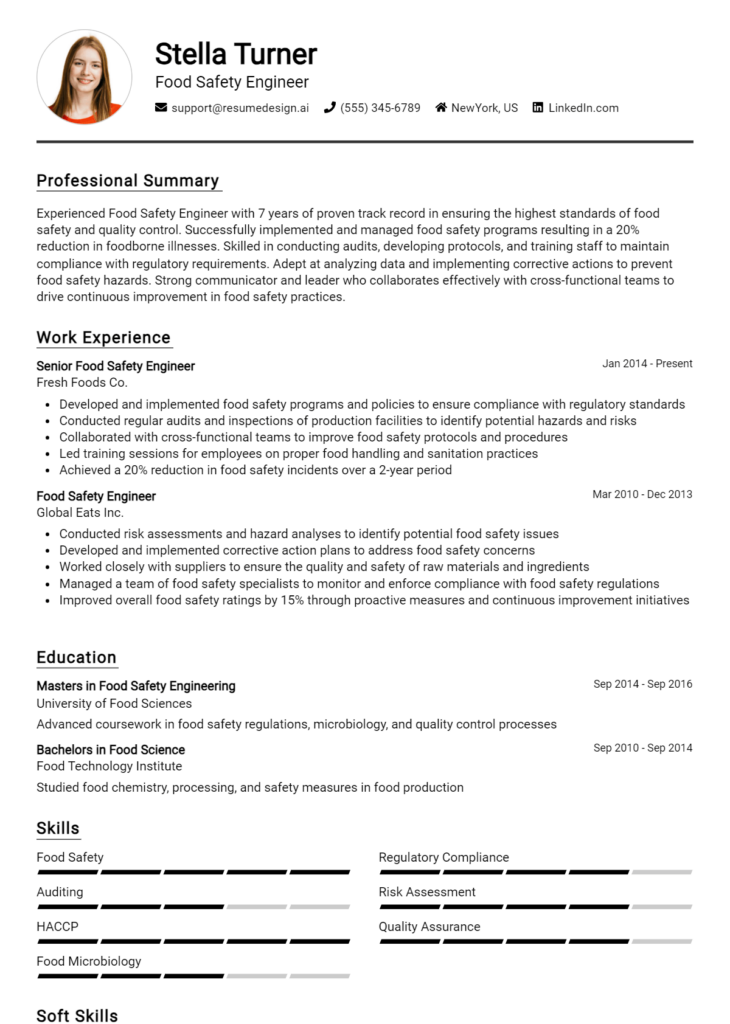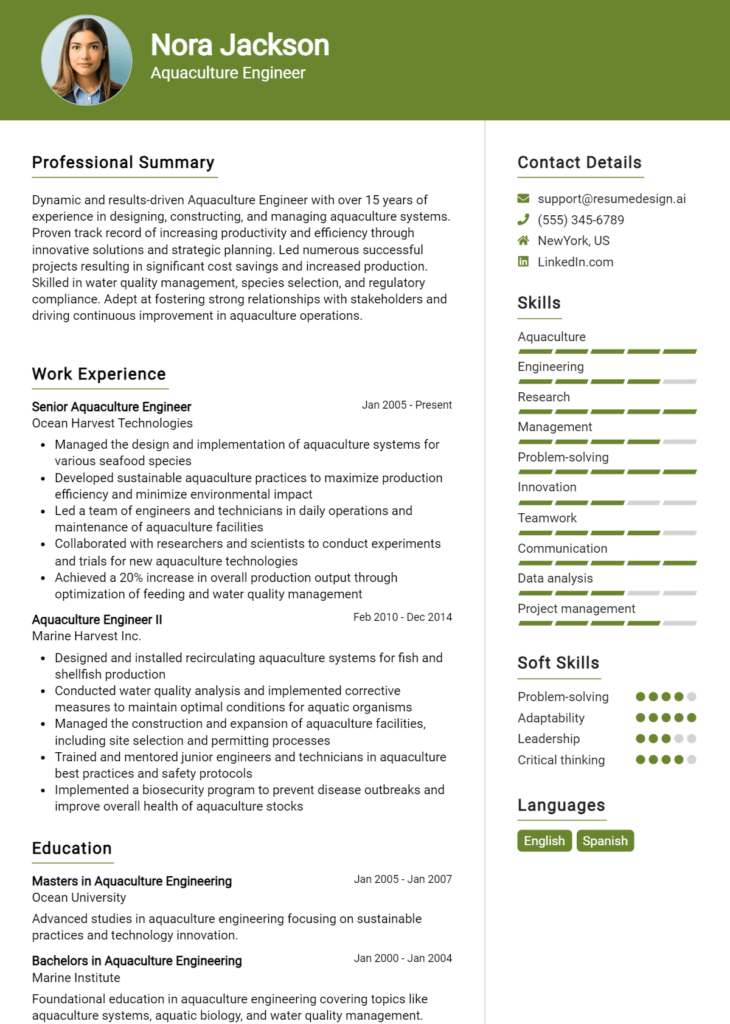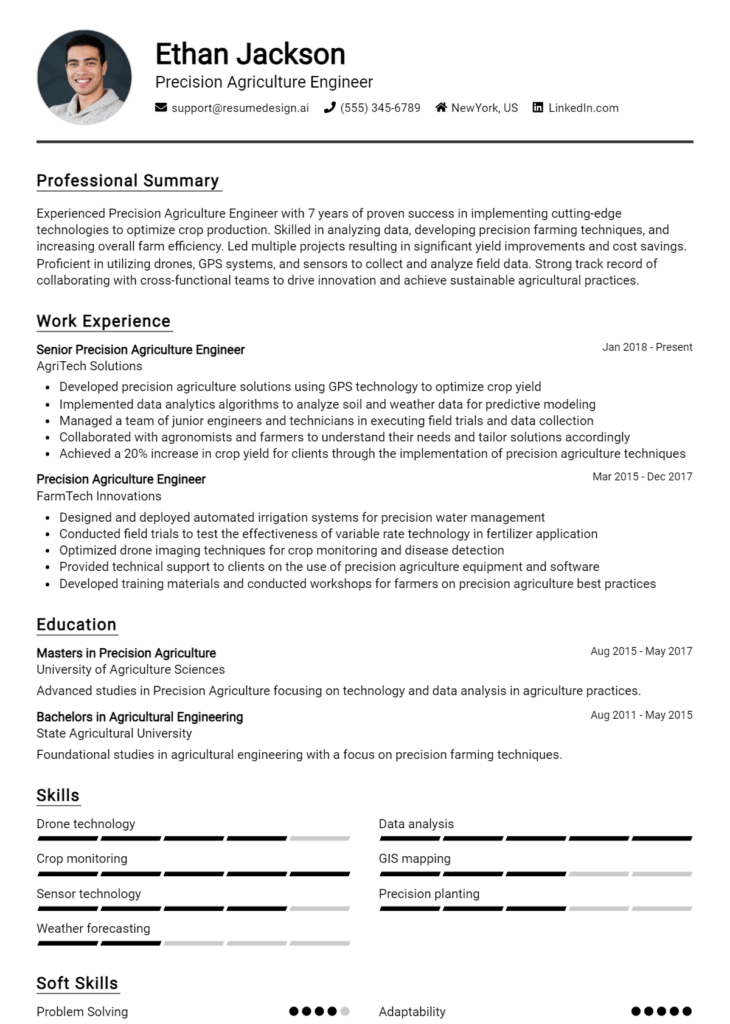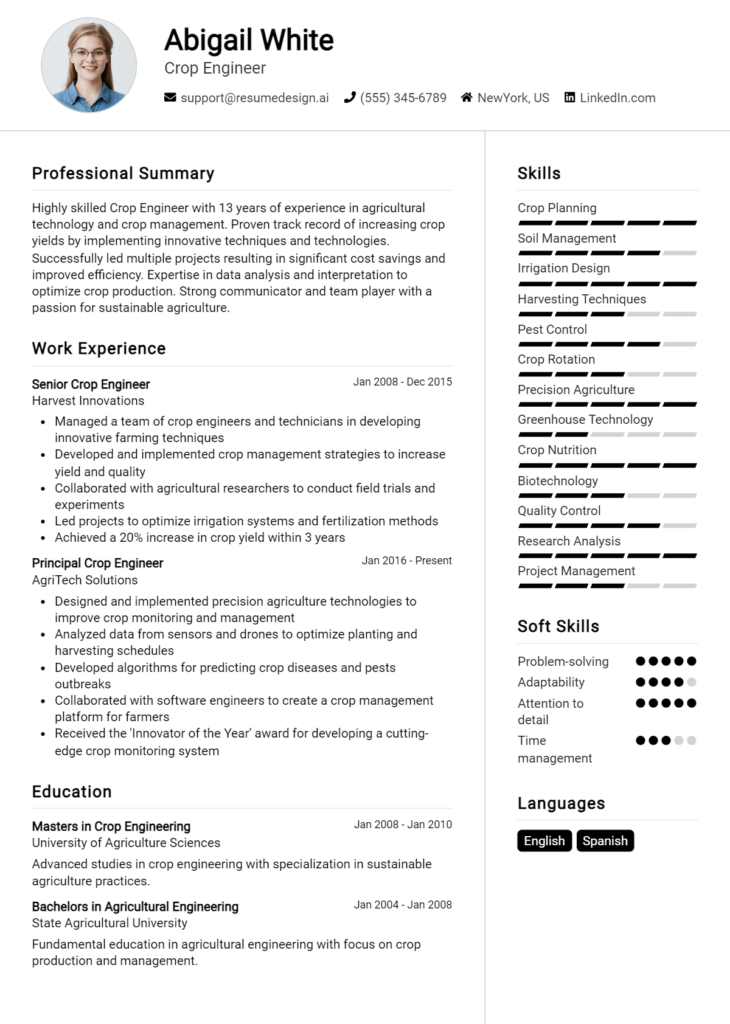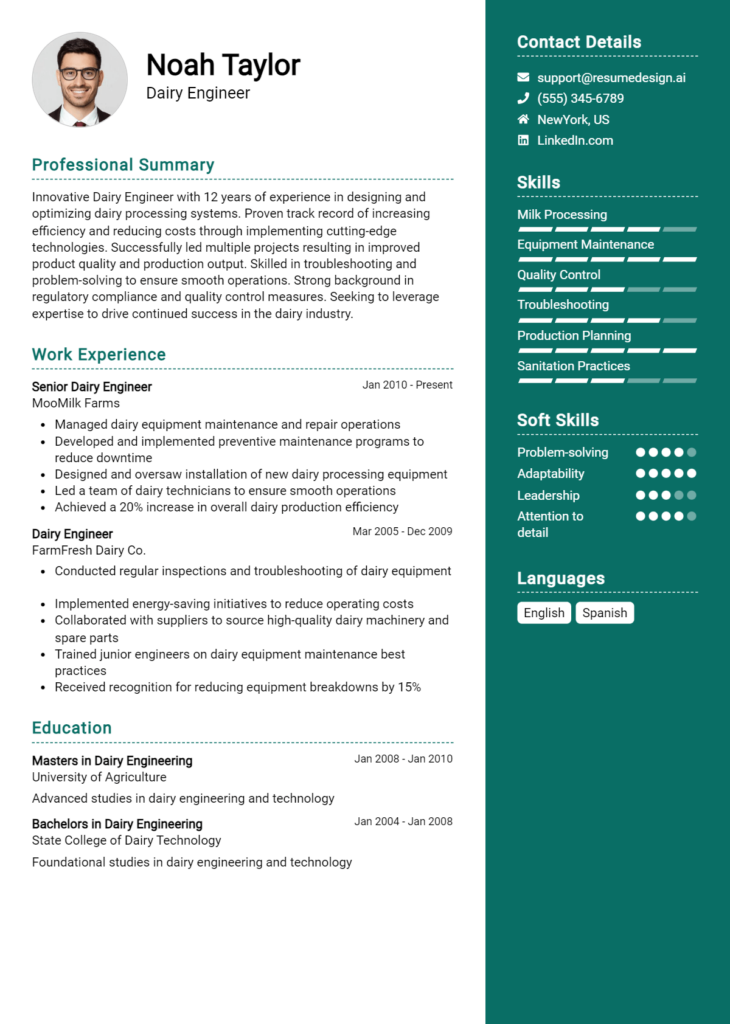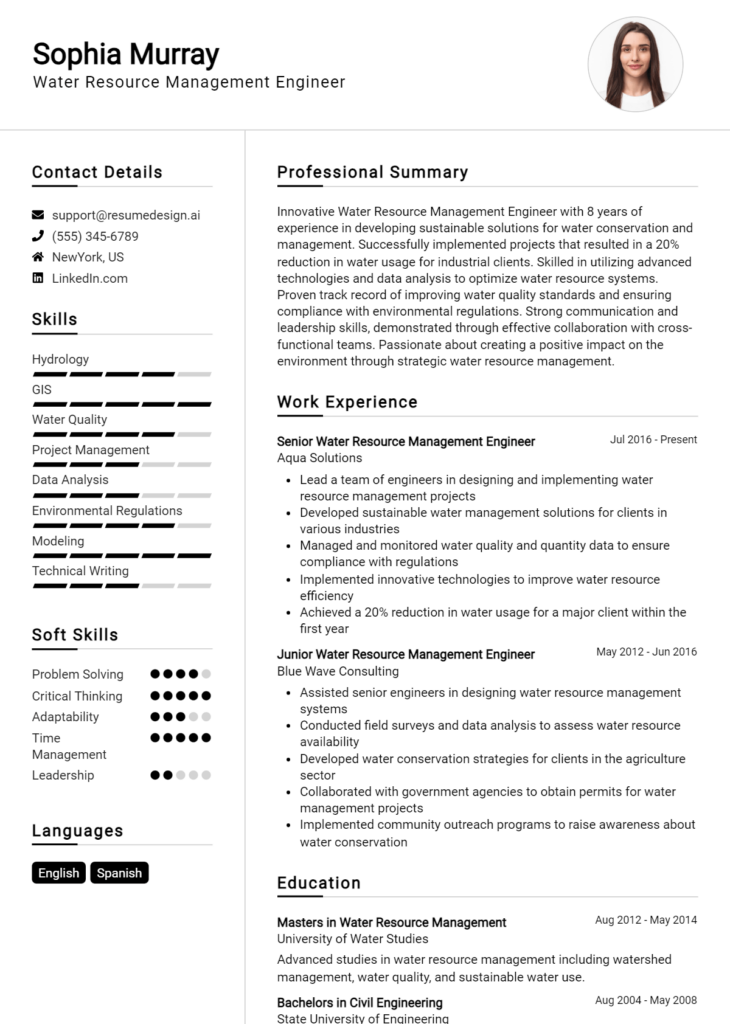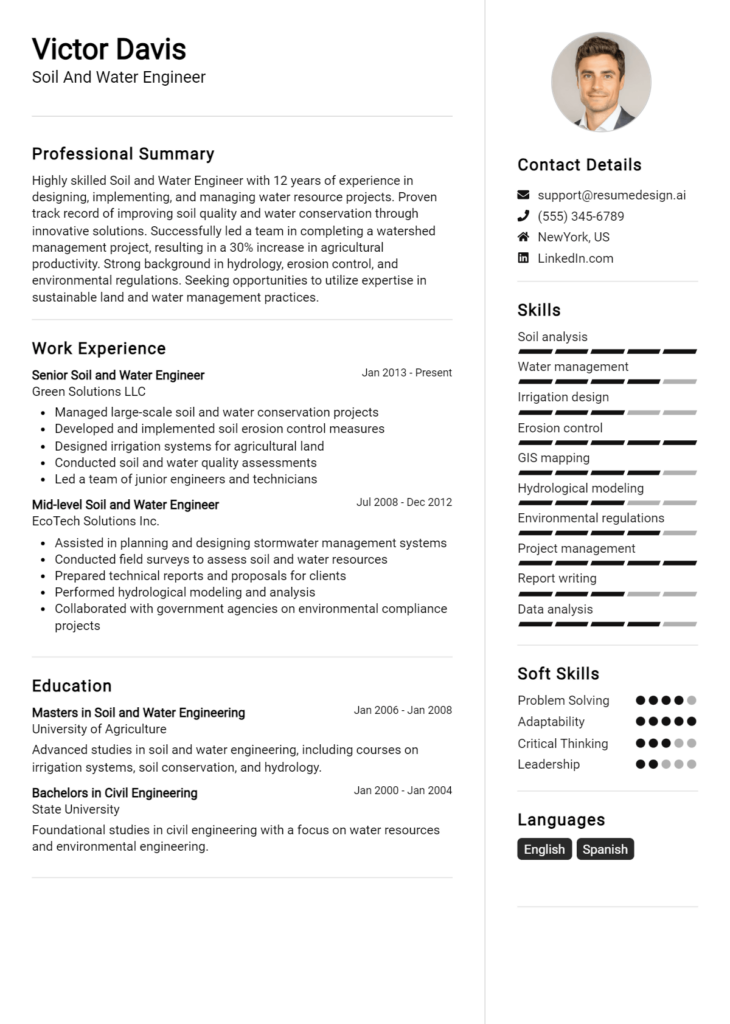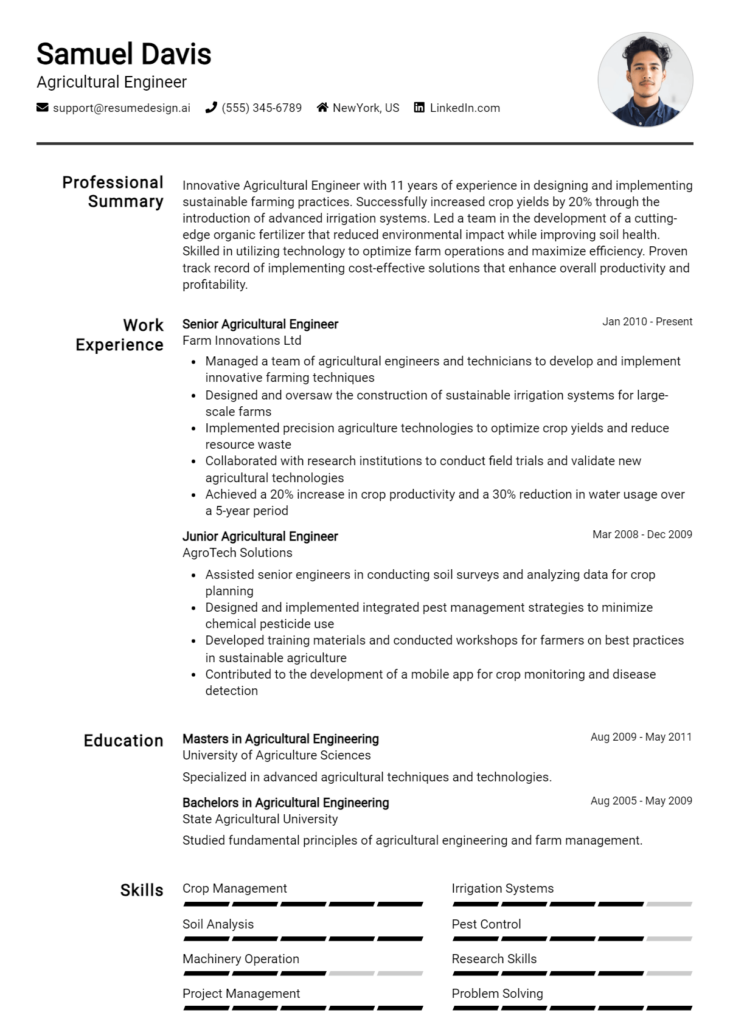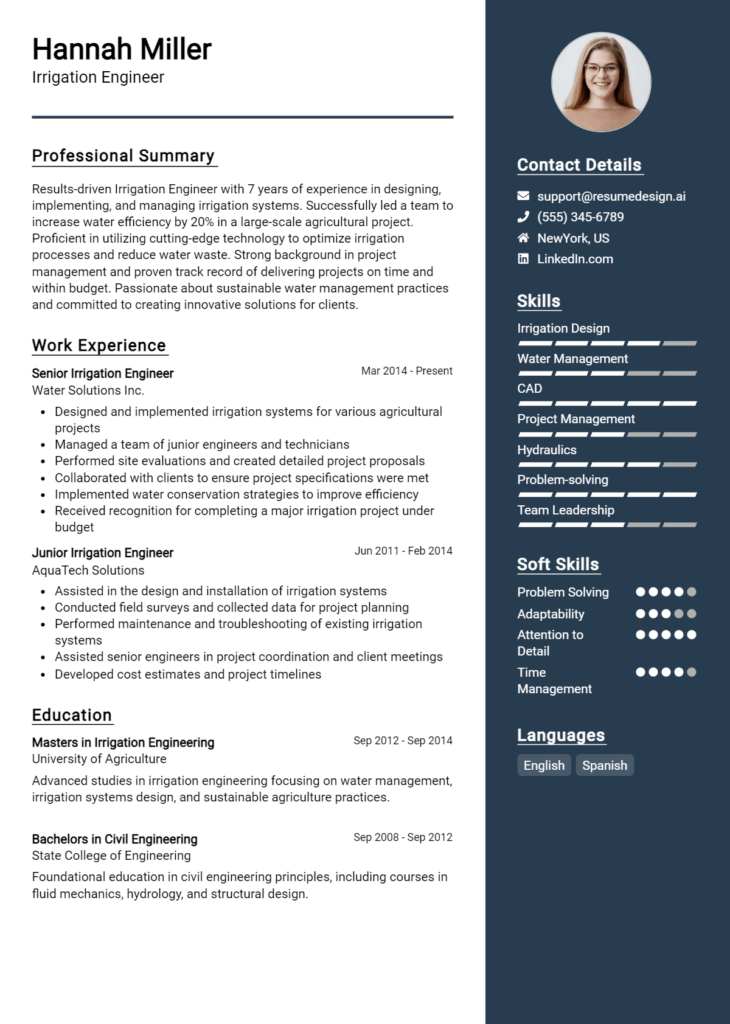Agricultural Machinery Engineer Core Responsibilities
An Agricultural Machinery Engineer plays a pivotal role in enhancing agricultural productivity through the design, development, and maintenance of machinery. Key responsibilities include conducting research to improve equipment efficiency, collaborating with cross-functional teams to ensure seamless operations, and troubleshooting technical issues. Essential skills encompass strong technical knowledge, operational insight, and advanced problem-solving abilities. These competencies not only contribute to the organization's goals but also enhance the engineer's resume, showcasing their qualifications effectively.
Common Responsibilities Listed on Agricultural Machinery Engineer Resume
- Design and develop agricultural machinery and equipment.
- Conduct feasibility studies and cost analysis for projects.
- Collaborate with agricultural scientists and production teams.
- Test prototypes and oversee field trials for machinery.
- Implement maintenance schedules to ensure optimal performance.
- Analyze equipment failures and develop solutions.
- Provide training and support to operators and technicians.
- Stay updated on industry trends and technological advancements.
- Ensure compliance with safety regulations and quality standards.
- Document technical specifications and project reports.
- Manage project timelines and budgets effectively.
High-Level Resume Tips for Agricultural Machinery Engineer Professionals
In the competitive field of agricultural machinery engineering, a well-crafted resume is not just a document; it’s your first impression on potential employers. With a multitude of candidates vying for attention, your resume must effectively reflect both your skills and achievements, showcasing your unique qualifications for the role. A strong resume can differentiate you from the rest, highlighting your expertise in machinery design, maintenance, and innovation. This guide aims to provide practical and actionable resume tips specifically tailored for Agricultural Machinery Engineer professionals, ensuring you present yourself in the best light possible.
Top Resume Tips for Agricultural Machinery Engineer Professionals
- Tailor your resume to match the job description, emphasizing keywords and skills that align with the specific position.
- Showcase relevant experience by detailing your previous roles, responsibilities, and the types of machinery you have worked with.
- Quantify your achievements with specific metrics, such as improvements in efficiency, reductions in costs, or successful project completions.
- Highlight industry-specific skills, such as familiarity with CAD software, knowledge of agricultural trends, and understanding of sustainable practices.
- Include certifications and training relevant to agricultural machinery, such as safety certifications, technical training, or specialized workshops.
- Utilize clear and concise language, avoiding jargon that may not be understood by all hiring managers.
- Incorporate a professional summary that encapsulates your career highlights and unique value proposition as an Agricultural Machinery Engineer.
- Consider using a clean, organized format that enhances readability and allows key information to stand out.
- Make sure to proofread your resume to eliminate any grammatical errors or typos, as attention to detail is crucial in engineering roles.
By implementing these tips, you can significantly increase your chances of landing a job in the Agricultural Machinery Engineer field. A well-structured and tailored resume not only showcases your qualifications but also demonstrates your commitment to the profession, making you a more attractive candidate to potential employers.
Why Resume Headlines & Titles are Important for Agricultural Machinery Engineer
In the competitive field of agricultural engineering, a well-crafted resume headline or title serves as a powerful tool for candidates looking to stand out to hiring managers. A strong headline can immediately capture attention, summarizing a candidate's key qualifications in a succinct and impactful phrase. It sets the tone for the rest of the resume, providing a clear and relevant snapshot of the candidate's expertise in agricultural machinery engineering. When tailored to the specific job being applied for, these headlines not only highlight the candidate's strengths but also demonstrate their understanding of the role, making them more appealing to potential employers.
Best Practices for Crafting Resume Headlines for Agricultural Machinery Engineer
- Keep it concise: Aim for a headline that is no longer than one to two lines.
- Be role-specific: Use terminology and keywords relevant to agricultural machinery engineering.
- Highlight key strengths: Focus on specific skills or achievements that align with the job description.
- Use action-oriented language: Choose dynamic words that convey impact and expertise.
- Tailor for each application: Customize your headline based on the specific job requirements.
- Avoid jargon: Ensure that your headline is easily understood by hiring managers, even if they are not specialists.
- Showcase qualifications: Incorporate relevant certifications or years of experience where applicable.
- Make it eye-catching: Use effective formatting (like capitalization) to make your headline stand out visually.
Example Resume Headlines for Agricultural Machinery Engineer
Strong Resume Headlines
Innovative Agricultural Machinery Engineer with 10+ Years of Experience in Precision Farming Solutions
Results-Driven Engineer Specializing in Sustainable Agricultural Equipment Design and Development
Expert in Agricultural Automation and Machinery Optimization with Proven Track Record
Dynamic Agricultural Engineer with Expertise in Tractor Systems and Field Operations
Weak Resume Headlines
Agricultural Engineer
Engineering Professional Looking for Opportunities
Experienced Worker in Agriculture
The strong headlines are effective because they clearly articulate the candidate's unique qualifications and expertise in agricultural machinery engineering, making them relevant to potential employers. They incorporate specific skills and experiences that align with job requirements, enhancing the candidate's appeal. In contrast, the weak headlines fail to impress as they are vague, generic, and do not convey any particular strengths or qualifications, making it difficult for hiring managers to gauge the candidate's suitability for the role.
Writing an Exceptional Agricultural Machinery Engineer Resume Summary
A resume summary is a crucial component for an Agricultural Machinery Engineer as it serves as the first impression to potential employers. A strong summary effectively captures the attention of hiring managers by succinctly showcasing key skills, relevant experience, and notable accomplishments tailored to the specific job role. It should be concise and impactful, allowing the candidate to highlight their expertise in agricultural technology, machinery design, and innovative solutions that drive efficiency in farming operations. A well-crafted summary sets the tone for the rest of the resume and encourages hiring managers to delve deeper into the applicant’s qualifications.
Best Practices for Writing a Agricultural Machinery Engineer Resume Summary
- Quantify Achievements: Use specific numbers to highlight your accomplishments, such as increases in efficiency or reductions in costs.
- Focus on Skills: Emphasize technical skills relevant to agricultural machinery, such as design software proficiency or mechanical troubleshooting.
- Tailor to Job Description: Customize your summary to align with the specific requirements and keywords of the job you are applying for.
- Highlight Relevant Experience: Mention past roles and responsibilities that directly relate to agricultural machinery engineering.
- Showcase Problem-Solving Abilities: Include examples of how you have resolved challenges in machinery design or implementation.
- Keep it Concise: Limit the summary to 2-4 sentences to maintain clarity and focus.
- Use Industry Terminology: Incorporate relevant jargon and terminology to demonstrate your familiarity with the field.
- Reflect Professional Growth: Mention any certifications or continuous education that showcases your commitment to the field.
Example Agricultural Machinery Engineer Resume Summaries
Strong Resume Summaries
Results-driven Agricultural Machinery Engineer with over 8 years of experience in designing and optimizing farming equipment, achieving a 30% increase in operational efficiency through innovative mechanization solutions.
Detail-oriented engineer with a proven track record of reducing machinery downtime by 25% through rigorous maintenance programs and effective troubleshooting strategies, enhancing overall productivity on the farm.
Skilled in CAD and simulation software, I successfully led a team in the development of a new line of precision agricultural tools that generated $1.2 million in sales within the first year of launch.
Dedicated Agricultural Machinery Engineer with expertise in sustainable practices, having implemented eco-friendly technologies that reduced fuel consumption by 40%, promoting both profitability and environmental responsibility.
Weak Resume Summaries
Experienced engineer looking for opportunities in agricultural machinery.
I have worked with machinery and have some skills in engineering.
The strong resume summaries are considered effective because they include specific achievements, measurable outcomes, and relevant skills that directly relate to the role of an Agricultural Machinery Engineer. They clearly demonstrate the candidate's value and impact in previous positions. In contrast, the weak summaries lack detail and quantifiable results, making them vague and unmemorable. They do not convey a clear sense of the candidate's expertise or contributions to potential employers.
Work Experience Section for Agricultural Machinery Engineer Resume
The work experience section of an Agricultural Machinery Engineer's resume is crucial as it serves as a platform to demonstrate the candidate's technical skills, leadership capabilities, and commitment to delivering high-quality products. This section not only highlights hands-on experience with agricultural machinery but also showcases the ability to manage teams effectively, ensuring that projects meet industry standards and are completed on time. Quantifying achievements, such as efficiency improvements or cost reductions, provides concrete evidence of the candidate's impact in previous roles, making it essential to align experiences with industry expectations.
Best Practices for Agricultural Machinery Engineer Work Experience
- Focus on technical expertise by detailing specific machinery and technologies used.
- Quantify achievements with metrics, such as percentage improvements or cost savings.
- Highlight leadership roles, including team management and project oversight.
- Align experiences with industry standards to demonstrate knowledge of best practices.
- Include relevant certifications and training that support technical skills.
- Use action verbs to convey a sense of initiative and accomplishment.
- Emphasize collaboration with cross-functional teams to achieve common goals.
- Tailor the experience section to the specific job application, focusing on relevant roles.
Example Work Experiences for Agricultural Machinery Engineer
Strong Experiences
- Led a team of engineers in the redesign of a harvesting machine, resulting in a 25% increase in efficiency and a 15% reduction in operational costs.
- Implemented a predictive maintenance program for agricultural equipment, reducing downtime by 30% and extending machinery lifespan by an average of two years.
- Collaborated with cross-functional teams to develop a new line of precision planters, achieving a 40% increase in planting accuracy compared to previous models.
Weak Experiences
- Worked on various machinery projects.
- Assisted in team tasks related to agricultural equipment.
- Participated in meetings about machinery improvements.
The examples provided illustrate the difference between strong and weak experiences. Strong experiences are characterized by specific details, quantifiable results, and clear demonstrations of leadership and collaboration. They effectively convey the candidate's impact within their roles. In contrast, weak experiences lack detail and measurable outcomes, making it difficult for employers to gauge the candidate's contributions and capabilities. This highlights the importance of providing clear, impactful descriptions in the work experience section of a resume.
Education and Certifications Section for Agricultural Machinery Engineer Resume
The education and certifications section of an Agricultural Machinery Engineer resume is crucial for demonstrating a candidate's academic foundation and specialized knowledge in the field. This section serves to highlight not only the degrees obtained but also relevant certifications and ongoing learning efforts that align with industry standards. By incorporating coursework, specialized training, and industry-recognized credentials, candidates can significantly enhance their credibility, showcasing their commitment to professional development and their readiness to tackle the technical challenges present in agricultural machinery engineering.
Best Practices for Agricultural Machinery Engineer Education and Certifications
- Include degrees from recognized institutions that are relevant to agricultural engineering or machinery.
- List certifications that are industry-recognized, such as those from professional associations or accredited bodies.
- Highlight specialized training programs or workshops that enhance specific skills related to agricultural machinery.
- Provide relevant coursework that directly pertains to agricultural machinery, engineering principles, or related technologies.
- Ensure the information is up-to-date, focusing on the most recent qualifications and certifications.
- Utilize clear formatting to enhance readability, making it easy for hiring managers to scan through qualifications.
- Emphasize any advanced degrees or certifications that demonstrate a higher level of expertise in the field.
- Tailor the education and certifications section to match the job description, emphasizing skills and knowledge areas that are particularly relevant to the position.
Example Education and Certifications for Agricultural Machinery Engineer
Strong Examples
- B.Sc. in Agricultural Engineering, University of California, Davis, Graduated May 2020
- Certified Agricultural Equipment Technician (CAET), National Institute for Certification in Engineering Technologies, 2021
- Advanced Certificate in Precision Agriculture Technology, Michigan State University, 2022
- Relevant Coursework: Soil Mechanics, Crop Production Systems, and Agricultural Machinery Design
Weak Examples
- B.A. in History, State University, Graduated June 2019
- Certification in Office Management, Online Learning Platform, 2020
- Completed a workshop on Gardening Techniques, Local Community Center, 2021
- Relevant Coursework: Introduction to Psychology, Basic Computer Skills
The examples provided illustrate a clear distinction between strong and weak qualifications. Strong examples reflect relevant degrees and certifications that directly contribute to the role of an Agricultural Machinery Engineer, showcasing both technical knowledge and specialized training. In contrast, weak examples highlight qualifications that do not pertain to the field or demonstrate a lack of focus on agricultural engineering, ultimately detracting from the candidate's suitability for the position.
Top Skills & Keywords for Agricultural Machinery Engineer Resume
As an Agricultural Machinery Engineer, possessing the right skills is crucial for building an effective resume that stands out to potential employers. Skills not only showcase your technical abilities and expertise but also highlight your problem-solving capabilities and adaptability in a rapidly evolving industry. A well-crafted resume that emphasizes both hard and soft skills can significantly enhance your job prospects by demonstrating your proficiency in designing, operating, and maintaining agricultural machinery. This balance between technical know-how and interpersonal skills is essential in ensuring that agricultural operations run efficiently and sustainably.
Top Hard & Soft Skills for Agricultural Machinery Engineer
Soft Skills
- Problem-solving
- Communication
- Team collaboration
- Critical thinking
- Time management
- Adaptability
- Attention to detail
- Project management
- Leadership
- Creativity
- Interpersonal skills
- Conflict resolution
- Decision-making
- Customer service orientation
- Initiative
Hard Skills
- Proficiency in CAD software
- Knowledge of agricultural machinery systems
- Mechanical engineering principles
- Electrical systems understanding
- Hydraulic and pneumatic systems expertise
- Troubleshooting and diagnostics
- Project design and planning
- Data analysis and reporting
- Familiarity with safety regulations
- Maintenance and repair techniques
- Quality control processes
- Agricultural technology integration
- Equipment calibration
- Understanding of soil mechanics
- Environmental impact analysis
- Robotics in agriculture
- Automation systems knowledge
- Programming skills for machinery operation
For more insights on how to articulate your skills and effectively present your work experience, make sure to tailor your resume to reflect both your technical and interpersonal competencies.
Stand Out with a Winning Agricultural Machinery Engineer Cover Letter
Dear [Hiring Manager's Name],
I am writing to express my interest in the Agricultural Machinery Engineer position at [Company Name], as advertised on [Job Board/Company Website]. With a Bachelor’s degree in Agricultural Engineering and over [X years] of hands-on experience in designing, testing, and implementing agricultural machinery solutions, I am excited about the opportunity to contribute to your esteemed organization. My passion for enhancing agricultural productivity through innovative machinery aligns perfectly with [Company Name]'s commitment to advancing the agricultural industry.
In my previous role at [Previous Company Name], I successfully led a project that focused on developing a new line of precision planting equipment that increased planting efficiency by 30%. My responsibilities included conducting thorough research, collaborating with cross-functional teams, and utilizing advanced CAD software to create and refine machinery designs. Additionally, my experience in conducting field trials and analyzing performance data has equipped me with the skills necessary to troubleshoot and optimize machinery for varying agricultural conditions. I am adept at balancing technical requirements with practical applications, ensuring that our solutions meet both performance and reliability standards.
I am particularly impressed by [Company Name]'s initiatives in sustainable farming practices and the integration of smart technology in agricultural machinery. I am eager to bring my expertise in automation and precision agriculture to your team, contributing to innovative projects that aim to improve efficiency and sustainability in farming operations. I believe that my proactive approach and dedication to staying current with industry trends will enable me to make a positive impact at [Company Name].
Thank you for considering my application. I am looking forward to the opportunity to discuss how my skills and experiences align with the goals of [Company Name]. I am excited about the possibility of contributing to your team and helping drive the future of agricultural technology. Please feel free to contact me at [Your Phone Number] or [Your Email Address] to arrange a conversation.
Sincerely,
[Your Name]
Common Mistakes to Avoid in a Agricultural Machinery Engineer Resume
Crafting an effective resume as an Agricultural Machinery Engineer requires attention to detail and a clear presentation of relevant skills and experiences. However, many candidates make critical mistakes that can hinder their chances of landing an interview. By being aware of these common pitfalls, you can enhance your resume's impact and showcase your qualifications effectively. Here are some prevalent mistakes to avoid:
Generic Objective Statement: Using a one-size-fits-all objective can make your resume blend in with others. Tailor your objective to reflect your specific goals and how they align with the potential employer's needs.
Lack of Specificity in Skills: Simply listing vague skills like "mechanical skills" fails to impress. Instead, specify your expertise in areas such as CAD software, hydraulic systems, or precision agriculture technologies.
Ignoring Relevant Certifications: Failing to mention industry-specific certifications, such as those from the American Society of Agricultural and Biological Engineers (ASABE), can leave out critical qualifications that set you apart from other candidates.
Overloading with Technical Jargon: While it's important to demonstrate technical knowledge, excessive jargon can confuse hiring managers. Aim for a balance that showcases your expertise while remaining accessible to all readers.
Not Quantifying Achievements: Stating responsibilities without quantifying accomplishments can make your contributions seem less impactful. Use numbers to highlight improvements, such as "increased machinery efficiency by 15% through design modifications."
Ignoring Soft Skills: Agricultural Machinery Engineers must work collaboratively with farmers and other stakeholders. Neglecting to mention soft skills like communication, teamwork, and problem-solving can give an incomplete picture of your capabilities.
Formatting Issues: A cluttered or poorly formatted resume can detract from your content. Ensure your resume is well-organized, with consistent fonts and headings to enhance readability.
Neglecting to Tailor the Resume for Each Application: Sending out a generic resume for multiple job applications can limit your effectiveness. Research each company and customize your resume to highlight the experiences and skills most relevant to each position.
Conclusion
As we’ve explored the vital role of an Agricultural Machinery Engineer, it’s clear that this position is crucial for advancing agricultural practices and boosting productivity. The responsibilities include designing, testing, and improving agricultural machinery to ensure efficiency and sustainability in farming operations. The integration of technology in machinery design not only enhances performance but also addresses environmental concerns, making it essential for engineers in this field to stay updated with the latest innovations and best practices.
In summary, Agricultural Machinery Engineers play a pivotal role in the agriculture sector by leveraging their skills to develop cutting-edge machinery that meets the demands of modern farming. Continuous learning and adaptation to new technologies are key to succeeding in this dynamic field.
Now is the perfect time to reflect on your career and ensure your resume accurately showcases your skills and experiences as an Agricultural Machinery Engineer. To assist you in this process, we encourage you to explore a variety of resources available online. Enhance your job application with professional resume templates and a user-friendly resume builder that can help you craft a compelling resume. Additionally, check out resume examples to gain inspiration and see how others in your field present their qualifications. Don’t forget to pair your resume with a strong introduction using our cover letter templates.
Take action today and ensure your resume stands out in the competitive job market for Agricultural Machinery Engineers!

